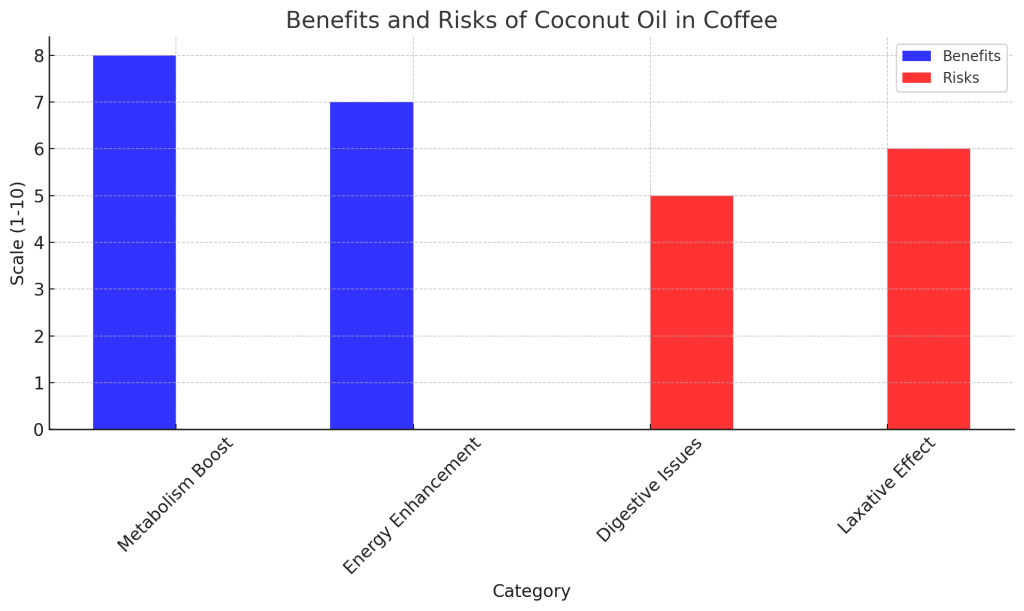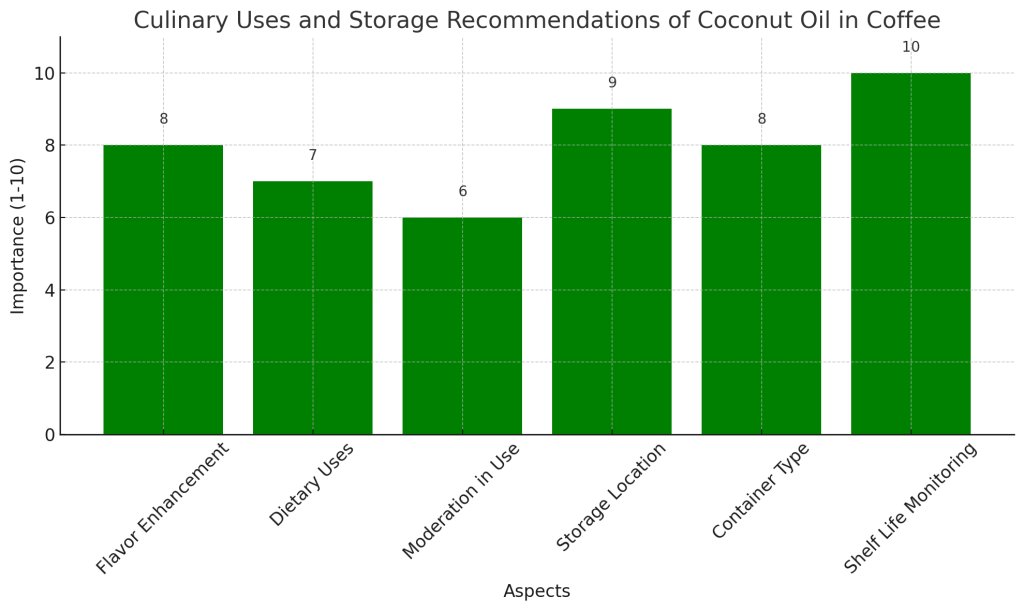Key Takeaways Table
| Aspect | Detail |
|---|---|
| Main Topic | Effects of Coconut Oil in Coffee |
| Benefits | Increased metabolism, energy boost, weight management |
| Potential Risks | Digestive issues, laxative effect |
| Nutritional Content | High in MCTs, lauric acid |
| Culinary Uses of Coconut Oil | Popular in ketogenic diets, flavor enhancement in cooking |
| Health Claims vs. Scientific Evidence | MCTs benefit debated, potential cholesterol impact |
| Storage and Shelf Life of Coconut Oil | 2-3 years for unrefined coconut oil, storage recommendations |
| Usage Recommendations | Moderate consumption, consultation with health professionals |
Understanding the Interaction of Coconut Oil and Coffee
Coconut oil, known for its health benefits, primarily consists of medium-chain triglycerides (MCTs) and lauric acid, which contribute to weight loss and improved heart health. When added to coffee, these components interact with caffeine to potentially speed up metabolism, possibly increasing the number of calories burned. This combination also leads to an enhanced energy boost due to the way the liver processes coconut oil’s fatty acids.
The Benefits of Coconut Oil in Coffee
- Metabolic Increase: The MCTs in coconut oil, when combined with caffeine, can accelerate metabolic conversion.
- Energy Enhancement: Adding coconut oil to coffee provides an additional energy boost, aiding in physical and mental well-being.
Potential Risks and Side Effects
While the benefits of coconut oil in coffee are notable, it’s crucial to be aware of potential risks:
- Digestive Issues: Consuming coconut oil in coffee on an empty stomach might cause indigestion, particularly in those with fat sensitivities.
- Laxative Effect: The high level of MCTs in the drink could lead to a laxative effect, advising caution in consumption.
Nutritional and Health Considerations
Coconut oil’s nutritional profile is unique, primarily composed of saturated fats, particularly lauric acid. However, it lacks cholesterol, fiber, and has only traces of vitamins and minerals. There’s a common misconception that coconut oil is mainly made of MCTs; most commercial versions contain lauric acid, a long-chain fatty acid, which may not offer the same benefits attributed to MCTs.
Recommendations for Consumption
- Moderation: It’s essential to consume coconut oil in coffee in moderation due to its high saturated fat content.
- Consultation with Health Professionals: Before incorporating coconut oil into your diet, especially in coffee, consult healthcare providers to ensure it aligns with your health needs and goals.

Coconut oil’s unique flavor and aroma make it a popular choice for culinary use, including in coffee. Its versatility extends from enhancing the flavor of coffee to being a key component in diets like ketogenic and Paleo. However, it’s important to use it in moderation considering its high fat and calorie content.
Table of Culinary Uses and Recommendations
| Aspect | Detail |
|---|---|
| Flavor Enhancement | Adds unique taste to coffee |
| Dietary Uses | Integral in ketogenic and Paleo diets |
| Moderation in Use | High fat and calorie content necessitates careful consumption |
Storage and Shelf Life of Coconut Oil
Proper storage is crucial to maintain the quality and extend the shelf life of coconut oil, which generally lasts 2-3 years for unrefined varieties. To ensure its longevity and safety, especially when added to coffee, follow these guidelines:
- Storage Location: Store in a cool, dark place, like a pantry or refrigerator.
- Container Type: Use glass containers to prevent chemical leaching and protect from light.
- Shelf Life Monitoring: Regularly check for signs of spoilage like discoloration, off-odors, or mold.

Health Claims vs. Scientific Evidence of Coconut Oil in Coffee
While coconut oil in coffee is popular for its purported health benefits, it’s important to examine these claims against scientific evidence.
Table of Health Claims vs. Scientific Evidence
| Health Claim | Scientific Evidence |
|---|---|
| Weight Loss and Metabolism | MCTs in coconut oil may aid in weight management, but its effectiveness is debated. |
| Heart Health | Coconut oil may increase healthy HDL cholesterol, but also raises LDL cholesterol and triglycerides. |
| Cognitive Health | Linked to improved memory and cognitive function; particularly beneficial for Alzheimer’s patients. |
| Antimicrobial Effects | Effective against various pathogens due to lauric acid converting to monolaurin. |
| Skin and Hair Care | Natural moisturizer for skin and hair, prevents dryness and damage. |
Recommendations for Coffee Enthusiasts
If you’re considering adding coconut oil to your coffee, here are some recommendations:
- Start with Small Amounts: To gauge tolerance and avoid digestive discomfort.
- Quality Matters: Choose high-quality, virgin coconut oil for maximum benefits.
- Pair with Balanced Diet: Incorporate it as part of a varied and balanced diet.
- Consult Healthcare Professionals: Especially if you have health conditions or dietary restrictions.
Conclusion: A Balanced Approach to Coconut Oil in Coffee
Incorporating coconut oil into coffee can be a delightful and beneficial addition to your diet when done correctly. Understanding the balance between the potential benefits and risks, and considering the scientific evidence behind health claims, is key to making informed decisions about this practice.

